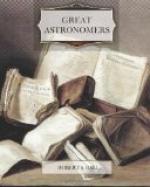It was on the 9th of May, 1865, that Hamilton was in Dublin for the last time. A few days later he had a violent attack of gout, and on the 4th of June he became alarmingly ill, and on the next day had an attack of epileptic convulsions. However, he slightly rallied, so that before the end of the month he was again at work at the “Elements.” A gratifying incident brightened some of the last days of his life. The National Academy of Science in America had then been just formed. A list of foreign Associates had to be chosen from the whole world, and a discussion took place as to what name should be placed first on the list. Hamilton was informed by private communication that this great distinction was awarded to him by a majority of two-thirds.
In August he was still at work on the table of contents of the “Elements,” and one of his very latest efforts was his letter to Mr. Gould, in America, communicating his acknowledgements of the honour which had been just conferred upon him by the National Academy. On the 2nd of September Mr. Graves went to the observatory, in response to a summons, and the great mathematician at once admitted to his friend that he felt the end was approaching. He mentioned that he had found in the 145th Psalm a wonderfully suitable expression of his thoughts and feelings, and he wished to testify his faith and thankfulness as a Christian by partaking of the Lord’s Supper. He died at half-past two on the afternoon of the 2nd of September, 1865, aged sixty years and one month. He was buried in Mount Jerome Cemetery on the 7th of September.
Many were the letters and other more public manifestations of the feelings awakened by Hamilton’s death. Sir John Herschel wrote to the widow:—
“Permit me only to add that among the many scientific friends whom time has deprived me of, there has been none whom I more deeply lament, not only for his splendid talents, but for the excellence of his disposition and the perfect simplicity of his manners—so great, and yet devoid of pretensions.”
De Morgan, his old mathematical crony, as Hamilton affectionately styled him, also wrote to Lady Hamilton:—
“I have called him one of my dearest friends, and most truly; for I know not how much longer than twenty-five years we have been in intimate correspondence, of most friendly agreement or disagreement, of most cordial interest in each other. And yet we did not know each other’s faces. I met him about 1830 at Babbage’s breakfast table, and there for the only time in our lives we conversed. I saw him, a long way off, at the dinner given to Herschel (about 1838) on his return from the Cape and there we were not near enough, nor on that crowded day could we get near enough, to exchange a word. And this is all I ever saw, and, so it has pleased God, all I shall see in this world of a man whose friendly communications were among my greatest social enjoyments, and greatest intellectual treats.”




